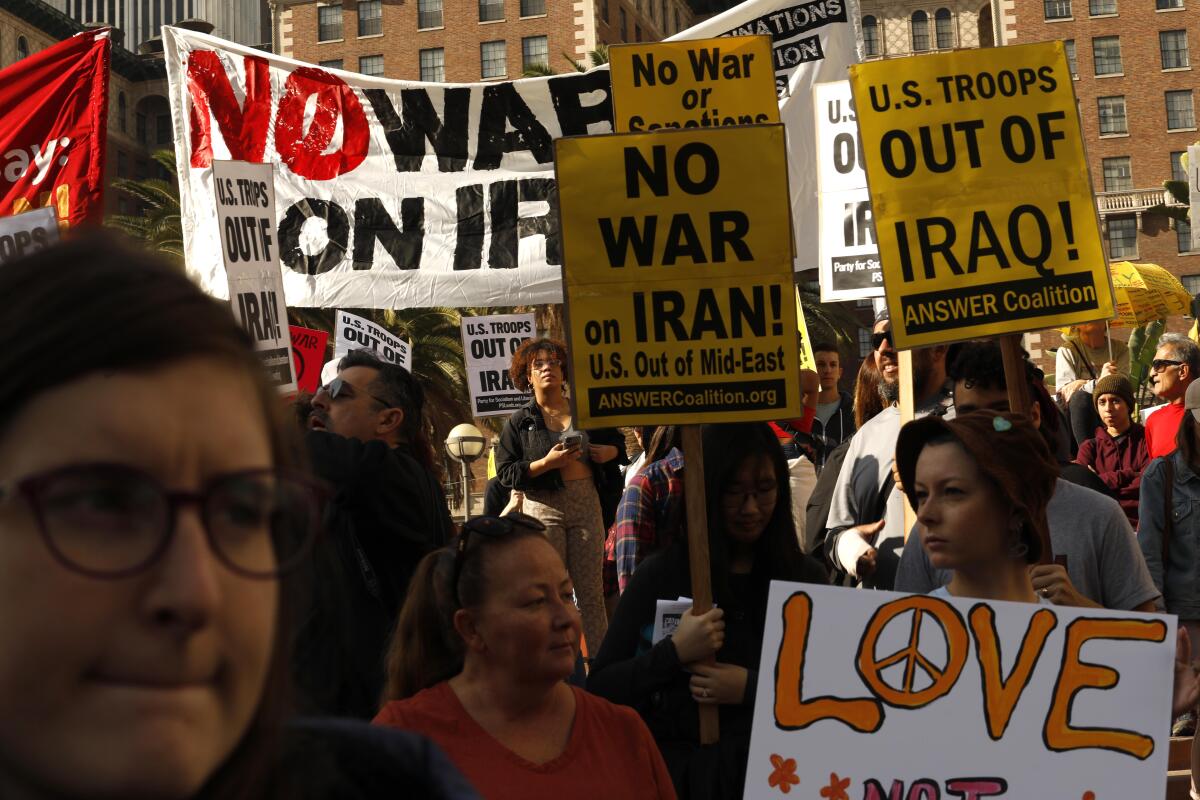We sure could use a credible president right about now

- Share via
After a U.S. drone blew up a top Iranian general last week, my 13-year-old son asked me if it was true that President Trump was reinstituting the draft. He’d heard that online, as had many of his friends; in fact, so many internet users sought to check out what was happening with the draft that they brought down the website for the Selective Service System.
There’s no indication that Trump is, in fact, planning to ask Congress to end the all-volunteer military and conscript young Americans again. The rumor that reached my son and his classmates was just a rumor — or rather, fake news.
That sort of thing might happen with any president in office, given the internet’s ability to spread outrageous news rapidly, regardless of whether it’s true. But one of the worst aspects of the situation we’re in right now is that the current president doesn’t have the power to dispel the reckless speculation and fearmongering that arises during tense times. He just doesn’t have the credibility.
Trump is, after all, the guy who claimed he was preventing a war by engaging in an act of war. He followed that up over the weekend with over-the-top threats against Iran and Iraq, saying that the U.S. would exponentially expand its response (and commit war crimes) if Iran retaliated against the U.S. for the drone strike and that the U.S. would not comply with an order to remove its troops from Iraq unless Iraq repaid us for the multibillion-dollar airbase we built there.
As we’ve seen repeatedly since January 2017, Trump is the anti-Teddy Roosevelt. He speaks loudly and doesn’t use the stick he brandishes. Sometimes the simple act of making a threat works — for example, he bullied a handful of U.S. allies into agreeing to alter their trade deals with the United States. But the bigger the stakes, the less effective the tactic appears to be. Witness the lack of progress in the talks with North Korea.
Just to be exceptionally clear, I’m not arguing that Trump needs to carry out the threats he makes in order to restore his credibility. His threats are the problem, not the lack of follow-through.
But Trump’s history of empty threats is just part of the issue. The bulk of his credibility problem is the relentless spouting of half-truths, untruths and who-knows-whether-it’s-trues. The Washington Post’s tally of Trump’s misleading and false statements hit 15,413 in mid-December, which translates to 15 per day he’s been in office.
So when the administration refuses to divulge the “imminent” threat that prompted the drone attack on Iranian Gen. Qassem Suleimani, Trump doesn’t get the benefit of the doubt. We don’t reflexively assume he’s protecting intelligence sources; we wonder if Trump simply took the most headline-grabbing option in front of him.
It’s well documented that Suleimani was responsible for multiple attacks on U.S. forces and interests; the former commander of U.S. forces in Iraq once called him “a truly evil figure.” But we don’t assure ourselves that he was killed at this particular moment because he was on the verge of committing another attack; we wonder if Trump was trying to shift attention away from his impeachment.
Regardless of whether you think killing Suleimani was a good thing, it’s undeniable that the president has steered us to the brink of war with Iran. At a time like this, Americans crave an administration that’s as forthcoming as it can be about its thinking and the risks we face, and that has a track record of believability. Instead, we’re left in a fog of tweeted threats from a president who started squandering his credibility the day after his inauguration.
More to Read
A cure for the common opinion
Get thought-provoking perspectives with our weekly newsletter.
You may occasionally receive promotional content from the Los Angeles Times.







